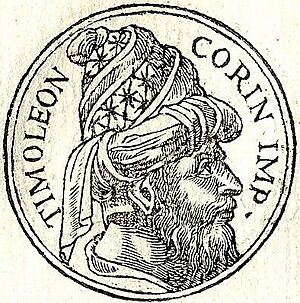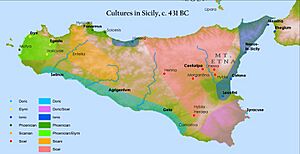Timoleon facts for kids
Timoleon (Greek: Τιμολέων) was a famous Greek leader and general from Corinth. He lived from about 411 BC to 337 BC. He was known for being a great general and for fighting against powerful rulers who had too much control.
Timoleon is closely linked to the history of Sicily, especially the city of Syracuse. He helped the people of Syracuse against their enemies and brought back fair government.
Contents
Early Life
Timoleon came from a powerful family in Corinth. In the 360s BC, his brother, Timophanes, took control of Corinth and became a harsh ruler. Timoleon had once saved his brother's life in battle. But after trying many times to get his brother to change, Timoleon was involved in removing Timophanes from power, which sadly led to his death.
Most people in Corinth thought Timoleon did the right thing for his city. However, this sad event, his mother's anger, and the feelings of some citizens made him step away from public life for twenty years.
Helping Sicily
Syracuse in Sicily was having many problems. Rulers with too much power, like Dionysius and his son, had caused a lot of trouble. Also, the powerful city of Carthage was often fighting with Syracuse.
In 344 BC, a group of people from Syracuse asked Corinth, their original home city, for help. Corinth agreed, but its main leaders didn't want to take on such a difficult job. Then, someone in the public meeting suggested Timoleon's name. Everyone agreed, and Timoleon was chosen to lead the mission.
He sailed to Sicily with seven ships and about 700 Greek soldiers. He cleverly avoided a Carthaginian fleet and landed in Tauromenium (now Taormina) in 344 BC. People there welcomed him.
At this time, Hicetas, a ruler from Leontini, controlled most of Syracuse. Only the island of Ortygia was still held by Dionysius II, who was still officially the ruler.
Fighting for Syracuse
Timoleon defeated Hicetas at Adranum and forced him back to Syracuse. After this first win, Timoleon received more soldiers from Corinth. After a long fight for Syracuse, Dionysius II gave up Ortygia in 343 BC. He was allowed to go to Corinth, where he lived out his life as a normal, wealthy citizen.
Hicetas then got help from Carthage, who sent a huge army of 60,000 men. But things went badly for Hicetas, and the Carthaginians stopped helping him. Hicetas was trapped in Leontini and had to surrender. Timoleon was now in control of Syracuse.
He immediately started to rebuild the city. He tore down the strong fort that the old rulers had used to control the people. In its place, he built a courthouse. He also brought new settlers from all over Greece to Sicily, as many cities had lost people. He brought back a fair government based on the laws of Diocles.
The Battle of the Crimissus
Hicetas convinced Carthage to send another huge army in 340–339 BC. This army, with 70,000 men, landed in Sicily. Timoleon had only about 12,000 soldiers, many of them hired fighters. He marched his army west.
Even though his army was much smaller, Timoleon won a great victory at the Crimissus River. His victory was helped because the Carthaginian army had not fully crossed the river. So, Timoleon's small force only had to fight a part of their elite soldiers. A strong storm also helped, blowing into the faces of the Carthaginians but at the backs of Timoleon's troops.
Later, Carthage sent more hired soldiers to keep the fight going between Timoleon and the Greek rulers. But this ended with Hicetas being captured and killed. In 338 BC, a peace treaty was made. Carthage agreed to stay west of the Halycus River in Sicily and not help any more Sicilian rulers. Most of the remaining rulers were killed or sent away. This treaty brought many years of peace, wealth, and safety to the Greeks in Sicily.
Leader of Syracuse
Timoleon created a new government for Syracuse. It was called a democracy, meaning the people had a say. For a short time, he had a lot of power, like a supreme commander. He invited people from mainland Greece to help repopulate Syracuse and other Sicilian cities. During this time, Greek Sicily became strong again in its economy and culture.
Retirement
Timoleon retired from public life after he had achieved his goals. He was greatly admired for his amazing victories, his fairness, and for bringing back democracy after many years of harsh rule, suffering, and problems.
Even after he retired, people respected him so much that if important decisions were being made, Timoleon, who was by then blind, would be carried to the assembly. His advice was usually followed. He was buried by the citizens of Syracuse, who built a monument to him in their market-place.
A Fair Leader?
Some ancient historians praised Timoleon very highly. Others, like Polybius, thought he was too biased towards Timoleon. Modern historians have different views.
Even though Timoleon sometimes used strong methods, he always tried to keep the outward look of democracy. He changed Syracuse to be more democratic and destroyed the old fort that rulers had used to control the people.
Timoleon's actions throughout his life show he believed in freedom and fair laws. For example, when he was wrongly accused in court, he refused to be let off. He said this was exactly why he had worked so hard – so that every citizen in Syracuse could use the laws and their legal rights freely.
A citizen of Syracuse spoke at Timoleon's funeral, saying that the people would honor him forever. This was "because, after having put down the despots, subdued the foreign enemy, and re-colonised the greatest among the ruined cities, he restored to the Sicilian Greeks their constitution and laws."
See also
 In Spanish: Timoleón para niños
In Spanish: Timoleón para niños
 | Delilah Pierce |
 | Gordon Parks |
 | Augusta Savage |
 | Charles Ethan Porter |



